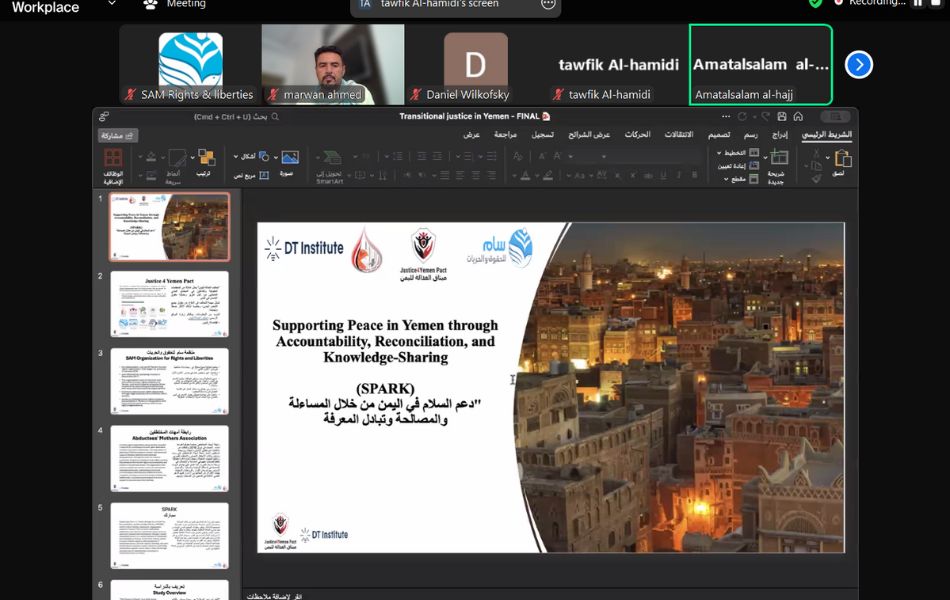
Geneva – On Thursday, April 24, SAM Organization for Rights and Liberties and the Abductees’ Mothers Association held a discussion symposium on transitional justice and national reconciliation in Yemen, with the participation of a number of experts and human rights activists. The event was part of the Spark Program supported by the DTI Institute.
The symposium opened with a keynote speech delivered by Amat Al-Salam Al-Haj, Chairwoman of the Abductees’ Mothers Association, who emphasized the importance of transitional justice as a fundamental entry point for achieving sustainable peace in Yemen. She stressed the necessity of placing victims' issues at the forefront of political settlements, warning against the dangers of ignoring violations, which could foster resentment and hinder national recovery.
For his part, Tawfiq Al-Homaidi, President of SAM Organization for Rights and Liberties, explained that the symposium was held within the framework of efforts aimed at enhancing community awareness of transitional justice concepts and linking victims to decision-making centers. He noted that the organization, in partnership with the Abductees’ Mothers Association and the DTI Institute, seeks to support peacebuilding through documenting violations and promoting reconciliation initiatives.
Meanwhile, Firas Hamdoun, Director of the Spark Program in Yemen, stated that the coalition, which includes ten civil society organizations from various parts of Yemen, initially began by documenting human rights violations in accordance with international standards, before evolving into a strong advocacy platform with over fifty participants comprising victims and survivors. Hamdoun pointed out that the coalition recently assumed a leading role in building the capacities of local communities and raising awareness about transitional justice concepts.
Hamdoun further noted the launch of a training activity targeting more than 150 participants in the field of transitional justice. He also announced the implementation of local restorative justice initiatives and the preparation for holding an international conference for stakeholders working on transitional justice, scheduled for next year. He stressed that transitional justice in Yemen is not merely a technical framework but rather a crucial part of the healing process and rebuilding society, affirming that there can be no sustainable peace without true justice and accountability.
Researcher Dan Kovacski from the DTI Institute presented the methodology used in the study on which the symposium was based, explaining that the research relied on in-depth interviews and focus group discussions conducted across six Yemeni governorates. He mentioned that the study aimed to identify victims' priorities regarding justice and redress, and to explore civil society's views on appropriate transitional justice mechanisms for Yemen.
The symposium provided a detailed presentation of the main findings of the study titled "The Road to Peace", jointly prepared by SAM Organization, the Abductees’ Mothers Association, and the DTI Institute. The study sought to understand Yemenis' perceptions of transitional justice and to survey the opinions of victims and field experts.
The presentation included an explanation of the study’s methodology, which encompassed individual interviews and focus group sessions in six key governorates. It revealed that 79% of participants had either personally experienced or had a family member who experienced direct violations, reflecting the depth of the humanitarian tragedy and the psychological and social impact on victims.
The discussion addressed several key topics, including mechanisms for compensating victims, the role of official institutions, the challenges facing the implementation of transitional justice, and the importance of involving victims and marginalized groups in formulating solutions. It also tackled the ongoing debate on the prioritization of reconciliation versus accountability, and the role of local and international actors in supporting human rights and humanitarian efforts in Yemen.
Attention was also given to the challenges facing Yemeni civil society, such as lack of funding, weak protection measures, and the need for capacity building in documentation and advocacy fields. The importance of involving traditional leaders and tribal figures was also highlighted, tailored to the nature of Yemeni society.
The symposium highlighted a set of recommendations, emphasizing the need to integrate transitional justice principles into any forthcoming political settlement, and the necessity of establishing independent national bodies for redress and compensation, along with enhancing the role of victims as active participants in peacebuilding efforts.
Participants also called for supporting local initiatives and enabling human rights organizations to carry out fieldwork through transparent international partnerships that contribute to building a comprehensive national path for transitional justice.
The organizers affirmed that this event represents a step within a broader series of efforts aimed at fostering human rights dialogue and knowledge exchange between local and international actors, toward a more just and stable future for Yemen.
At the conclusion of the symposium, Tawfiq Al-Homaidi reaffirmed that transitional justice is not a political option but a legal and moral obligation toward the victims. He called on all Yemeni parties to rally around its principles to ensure that violations are not repeated, and to build a new Yemen founded on justice, accountability, and human rights values.